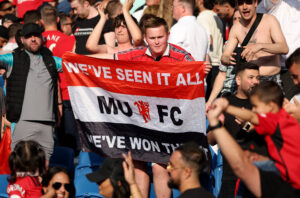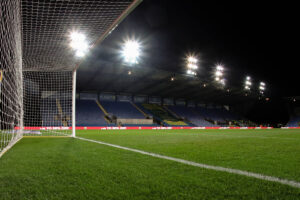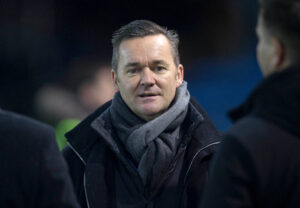It was Lord Acton, a 19th century politician and historian, who coined the most famous phrase about power and its consequences: “Power tends to corrupt, and absolute power corrupts absolutely”. However, power doesn’t always corrupt. Often, it just corrodes, as in “weakens”, or “gradually destroys”. And even if he is a mere football manager rather than a politician, Arsene Wenger exemplifies that.
Arsene Wenger Proves That Power Corrodes and Absolute Power Corrodes Absolutely
The 21-year career of Wenger as the Arsenal manager neatly divides into two parts: the Highbury era (1996 to 2006) and the Emirates era (2006 to the present day). The Highbury era was the period in which Wenger demonstrated that he was a truly great manager. In addition to his remarkable trophy haul (three league titles, four FA Cups, two doubles and two losing European finals, including a near-miss in the 2006 Champions League final), he achieved something that arguably no other manager in the history of the game – certainly in England, but arguably anywhere – has achieved, which was to completely alter the playing style of an already successful club.
As many protesting Arsenal fans have pointed out in the last few years, Arsenal’s success predates Wenger’s arrival at the club; the club had already won 10 league titles before Wenger took charge. However, what Wenger did that was unprecedented was to make Arsenal a team that won with style. Almost every successful Arsenal team before him, from the dominant Herbert Chapman-created side that won five league titles in the 1930’s to the 1971 double-winners to George Graham’s two title-winning teams, had undoubtedly won trophies but in doing so they had won few friends, or more precisely few neutral admirers. In almost all of those teams, the emphasis was firmly on defence first, attack later, leading to accusations that Arsenal were essentially a “boring” team.
Wenger’s great Highbury teams were anything but boring. In fact, they transformed the club from “boring, boring” Arsenal to “scoring, scoring” Arsenal, as a succession of great players (and especially great attacking players), from Overmars and Anelka to Henry and Pires, altered Arsenal’s entire DNA, from that of a club that simply won to that of a club that won with grace and elan. The high-point was undoubtedly the “Invincibles” side of 2004, who not only went unbeaten for the entire league season but in the process absolutely demolished many sides, even supposed rivals. For all their greatness in the league, probably their single finest display came in an away FA Cup tie at Portsmouth (back when Portsmouth were a Premier League side themselves), when they produced such a staggeringly good performance that Alan Hansen described them as the finest attacking side he had seen in his forty years of playing or watching football professionally.
Of course, that is all a long time ago now. In complete contrast, the 2016-17 team has failed to meet even its minimum target of qualifying for the UEFA Champions League, which for so long was Wenger’s last defence against opponents and critics who claim that he has ceased to be a great manager and instead become a thoroughly mediocre one. And on the eve of an FA Cup final against Chelsea, the Premier League champions, in which Arsenal are considered no-hopers in a two-horse race, the question is, “Why?”
Why did Wenger lose his way so completely, to the extent that some Arsenal fans now genuinely hope that the team lose badly at Wembley, in the hope that a crushing defeat will finally end what for them is an entirely knackered old regime?
The answer is not immediately simple or evident. Other once-great managers who eventually lost their greatness were genuinely corrupted by the power that they acquired. George Graham, Wenger’s predecessor as a title-winning Arsenal manager, is the obvious example, becoming so completely corrupted that he ended up “taking a bung” and losing his job as a result. Similarly, Brian Clough, probably the greatest of all football managers, was absolutely corrupted by the absolute power he ended up enjoying at Nottingham Forest after his two European Cup wins. Not only did he succumb to alcoholism, but he too was accused of financial impropriety, although it is important to stress that, unlike Graham, such charges were never proved.
With Wenger, it is more complex than that. He is nothing if not highly ethical, especially when it comes to financial matters. His own early experiences as a manager in France, as the Monaco manager who was suspicious of Bernard Tapie’s Marseilles long before it was proved that they had bribed opposing players, informed his whole approach to the use, or misuse, of money in football. It is what has made him so sniffy, even dismissive, of his opponents at Wembley, who, as far as he is concerned, are almost as much the beneficiaries of “financial doping” (his own phrase) as Tapie’s Marseilles side.
Instead, rather than corrupting Wenger, the power he has enjoyed as a manager, and particularly the absolute power he has enjoyed since Arsenal moved to the Emirates, has ended up corroding him. It has weakened him, sapping him of his previous strength, to the extent that he is now merely a shadow of his former self.
It is now clear that, for all Wenger’s own brilliance as a manager in his first decade at Arsenal, he also benefited hugely from the support network that he enjoyed at the club in that period. His most prominent supporter, of course, was David Dein, who was officially the vice-chairman but in reality was his right-hand man, often doing the deals that secured so many star players. In particular, it is often said that it was Dein who secured the signing of Sol Campbell, who Wenger was allegedly wary of signing until Dein impressed upon him the importance of signing a star defender to go alongside all his stellar attacking talent.
However, it was not only Dein who was part of Wenger’s support network in his first ten years at the club. There were also the players themselves, and not just the old English stalwarts – Adams, Bould, Keown et al – who he inherited when he took over, but those he signed, particularly Vieira and Henry. As Adams himself has said, most recently while promoting his new book Sober, that dressing room effectively policed itself, with strong personalities such as Adams himself and then Vieira and Henry openly challenging Wenger off the pitch and, if necessary, taking charge on the pitch and making any alterations that were required, such as when Adams insisted halfway through the 1997-98 season that Petit and Vieira stopped attacking so much and started offering their defence some much-needed protection.
The existence of such a support network, both off the pitch (in the form of Dein) and on the pitch (in the form of powerful personalities such as Adams and Vieira), allowed Wenger to demonstrate all his own unique abilities: the revolutionary approach to sports medicine and nutrition; the insistence on attacking play, even at a club that had long prided itself (and been derided by others) for its emphasis on defence; and above all the ability to lead a group of players and officials who themselves possessed extraordinary leadership powers.
The contrast with the current Arsenal regime could not be starker. Since Dein left in 2007, after falling out with the rest of the board over his desire to bring in someone like Alisher Usmanov to provide Arsenal with the financial firepower of Abramovich’s Chelsea, there has been no-one else at the club who has been able to offer him both footballing knowledge and critical (in the true sense of the word) friendship. Worse still, the other board members, and even the new owner Stan Kroenke, have seemingly been content to let him run the club as a one-man show, to the extent that he has arguably become more of a CEO than a coach (whatever Ivan Gazidis’s official job title may be).
If anything, the situation on the pitch has been even worse, with Arsenal’s succession of great club captains in the past (McClintock, Adams, Vieira) being replaced by a succession of non-playing club captains (Vermaelen, Arteta and Mertesacker). And that process reached its inevitable, farcical conclusion last weekend when the man who is effectively the current captain of the team, Laurent Koscielny, ruled himself out of the FA Cup final. Indeed, Koscielny’s tackle against Everton was so utterly indefensible that some Arsenal fans have since wondered aloud whether, if only subconsciously, he so feared a rout at Wembley that he wanted to do anything to avoid playing in that game. That may sound ludicrous, but ludicrous is where Arsenal are at right now, as Wenger himself proved with his complete failure to condemn Koscielny’s actions.
From a man who was at the heart of a network of powerful Arsenal figures, both on and off the pitch, who worked together collectively under the manager’s overall leadership to achieve greatness, Arsene Wenger has transformed himself over time into a man who is now completely alone, with no-one on the board either willing or able to stand up to him and no-one on the pitch either willing or able to stand up to him or any powerful and/or skilful opponent. In effect, Wenger, who was once the “Second Emperor of Arsenal” (after the immortal Chapman), is now “the Emperor with no clothes”, who has no little boy, or anyone else, to tell him that he is completely stark naked.
Main Photo:






